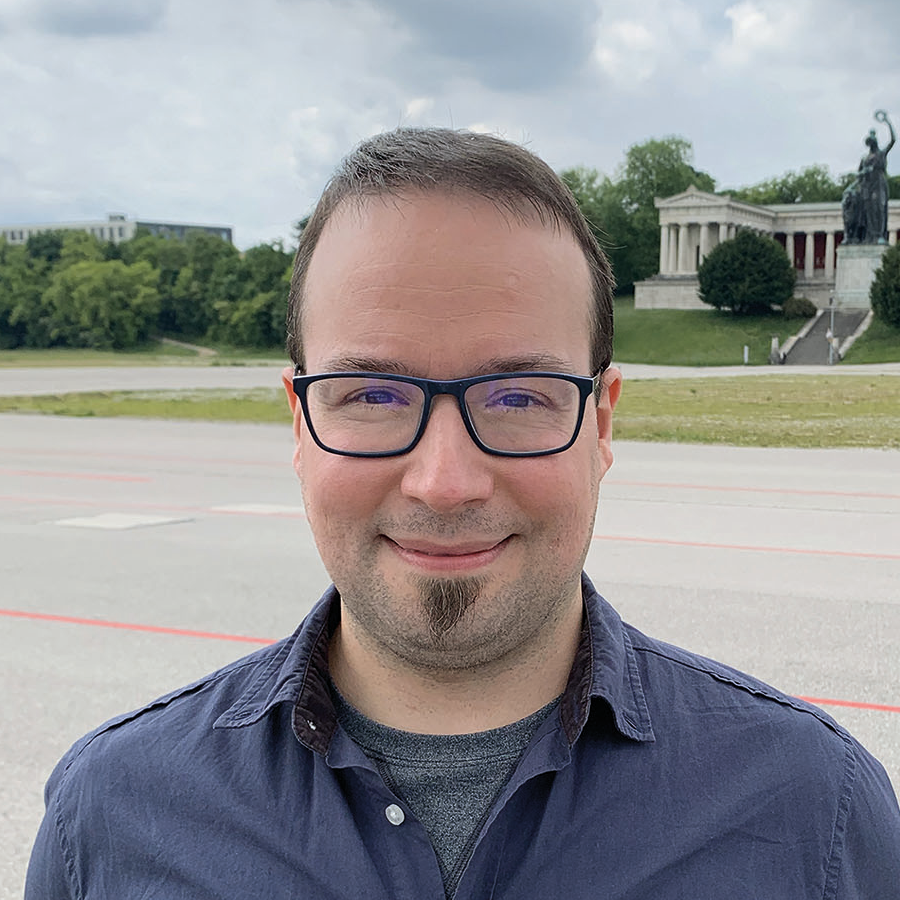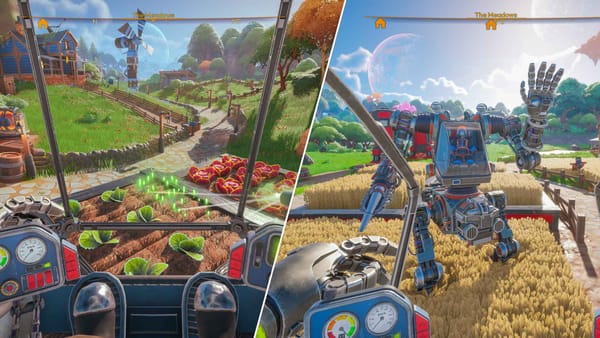Skövde as a Gaming Hub and a Look at Lightyear Frontier's Progress During Early Access




Many gaming hits originate from Skövde in Sweden, including Valheim, Satisfactory and Lightyear Frontier. What is the reason for this, and how is the Early Access version of Lightyear Frontier progressing? We discuss these questions with Joakim Kopriva Hedström, CEO, Co-founder and Game Designer at Frame Break.
In Lightyear Frontier, players use their customisable mech to grow alien plants, build their own farm and explore the wilderness, either alone or in co-op mode. This relaxing and peaceful game combines farming, base building, exploration and resource management in a sci-fi setting. Developed by Frame Break and Amplifier Studios, the game was released in Early Access in March 2024 and has quickly become a hit and is growing bigger than originally anticipated.
Like so many other developers of gaming highlights such as Valheim, V Rising or Satisfactory, Frame Break originated in Skövde, Sweden. During Nordic Game 2025, Joakim Kopriva Hedström, CEO, Co-founder and Game Designer at Frame Break, explained to us why this is the case and how Lightyear Frontier is performing in Early Access. Incidentally, the game has been nominated for two Nordic Game Awards 2025: Best Fun for Everyone and Best Debut.
Nordic Game is the leading games conference in Europe. Gathering thousands of industry professionals in the spring each year, Nordic Game is the "home turf" meeting place for game developers of Denmark, Finland, Iceland, Norway and Sweden. The Nordic Game Awards is a collaboration between Nordic Game and the Nordic Game Institute to highlight and celebrate the achievements of developers in the nordic region. This years awards takes place at 18:30 CEST on 22 May 2025, broadcasted on YouTube and Twitch.
GamesMarkt: Could you start by providing us with a brief overview of Frame Break?
Joakim Kopriva Hedström: "Frame Break was founded by a trio of game development graduates from the University of Skövde (including myself) in early 2020. We'd been tinkering with minor game projects together for about 2 years at that point, and decided to commit to something big with the formation of the company and the start of the project that would become Lightyear Frontier."
"We spent most of that year working on the alpha and pitching the game concept at various digital events, which eventually paid off as we were acquired by Amplifier Game Invest in the spring of 2021. That set us on an accelerated path where we were able to recruit more team members and pursue a more ambitious version of the game."
"Since then, we've grown our studio to over 15 people, secured a Game Pass deal with Microsoft, and released Lightyear Frontier into Early Access in March of 2024, quickly reaching over a million players! We've since been hard at work improving the game in response to player feedback."
GamesMarkt: Lightyear Frontier has been in the Early Access phase for over a year now. How satisfied are you with the Early Access phase so far? What will the major overhaul comprise that you have announced for the beginning of March 2025?
Joakim Kopriva Hedström: "There are a lot of feelings, and it's hard to summarize everything just in terms of how satisfied we are. On the one hand, we're happily overwhelmed and extremely appreciative of the huge player response and deluge of feedback. On the other hand, that feedback showed us that we didn't quite hit the mark in terms of living up to the expected player fantasy, so that was a bitter pill to swallow. But from that, we found our resolve again and decided to fully embrace the Early Access journey and go back and re-examine and rework basically every system in the game to give our players what they deserve."
"There's been no stone left unturned. To give the complete picture, I'd have to paste the full patch notes here, but I'll spare you that and instead give you a sample of a few of the things we've been working on:
"Besides that, we've made significant changes to farming, the main progression system, the narrative presentation, the out-of-mech gameplay, and various other tweaks and improvements all across the game experience."
"It truly is a different game, and we've been working on it nonstop for the last 6 months. We aim to fully deliver on our players' hopes for what Lightyear Frontier can be and then some!"
GamesMarkt: How difficult was it to make such a significant change during Early Access, given that it will extend development time and costs? And what feedback has Amplifier given?
Joakim Kopriva Hedström: "It has certainly been a challenge. Shortly after the completion of the Neighbors & Animals patch last year, we held a meeting to reassess our plans based on the feedback we'd gotten. We always knew our plans would change during Early Access and were prepared to adjust accordingly, but it took a while to fully understand and accept that we needed to make more fundamental changes and completely abandon our previous roadmap. While that was a bit daunting to come to terms with at first, it felt very invigorating when we started making prototypes and could get a feel for the amazing impact of these changes."
"The feedback from Amplifier has been very straightforward: we should do what is best for the game, and we would not be making these changes if both parties did not agree that it is the correct thing to do."
GamesMarkt: What makes Lightyear Frontier stand out from other games in the genre? How would you describe the current market for open-world farming adventures?
Joakim Kopriva Hedström: "I'd say there is a level of freedom in Lightyear Frontier that is rarely seen in farming games. Most of the time, you inherit your grandfather's run-down farm, which usually defines the boundaries and general shape of your homestead, even if you can shuffle things around inside those boundaries."
"In Lightyear Frontier, you're free to settle your homestead anywhere you like on an alien planet, and with the upcoming modular building system, you can build it piece by piece just as you envision it. Something that has always been a strong visual fantasy for the game is billowing fields strewn across a hilly landscape, something that most of the grid-based farming experiences can't replicate. In Lightyear Frontier, you can simply transform your mech into a plow and start tilling the earth to make your fields as small or large as you wish; you've got a whole planet to work with."
"The mech enables a power level usually seen via high amounts of automation, you can still have that hands-on farming feeling even as you expand to massive fields. Harvesting several rows of wheat with a single swing of your spike saw feels good no matter how many times you do it. In essence, Lightyear Frontier is trying to bridge the gap between the satisfying checklist gameplay of farming sims and the sandboxy freedom seen in open-world survival games. Our goal is to be a fun, expansive, and satisfying experience for fans of both genres."
GamesMarkt: How important is the 'peaceful' in Lightyear Frontier aspect to you?
Joakim Kopriva Hedström: "It continues to be a guiding star for our farming experience. You should be able to sit back, relax, and enjoy the fruits of your labor. We also see it as key to how the player interacts with their environment. You're not here to exploit and transform the planet to suit your needs, but to become a part of it and appreciate the nature that exists.
"However, that doesn't mean the game is devoid of challenge; we also want to reinforce the idea that this is an alien planet and exploring it will not always be easy. We stand by our firm stance to not add outright combat to the game, but there will be threats that you need to overcome in order to thrive in your new home."
GamesMarkt: This doesn't have much to do with Lightyear Frontier ... Why do so many great and successful game concepts come from Skövde, like V Rising (Stunlock Studios), Satisfactory (Coffee Stain Studios), Valheim (Iron Gate Studio) or Raft (Redbeet Interactive)?
Joakim Kopriva Hedström: "It's a combination of several factors that ended up synergizing in unexpected ways. First of all, there is the University of Skövde, which was one of the first universities in Sweden to offer game development studies in the early 2000s. Ever since, it has served as a melting pot for aspiring game developers to meet and mingle, finding kindred spirits with similar ideals."
"While there are many other game development courses offered across the country nowadays, most of them are vocational schools that produce specialized talent, ready to apply to any of the major Swedish game studios. Meanwhile, Skövde's game studies is an academic program, and its alumni end up with a broader skillset that is better suited for the wearing-many-hats nature of indie game development."
"So you have groups of trained game developers with a broad skillset who might easily think, "What if we just started our own studio?" and as if by design, there is a specialized game studio incubator here in town that will welcome you with open arms. The incubator gives the teams coaching and the tools necessary to start their own company and start looking for funding, setting up events, or sending them to gamescom or GDC to pitch to investors or publishers."
"While most of the teams don't stay intact long enough to finish the journey to funding, there are usually 1 or 2 standouts each year that graduate from the incubator and start their indie journey in earnest. At this point, you might expect these successful startups to use their funding to set up shop in Stockholm or Malmö, the bigger gaming hubs in Sweden, but Skövde Municipality obviously wants to keep the talent they've been nurturing, so their solution is to offer modern, affordable office space in the ever-growing Science Park."
"So you've got a pipeline that continuously produces skilled, motivated teams with the means to start their own studios and a reason to stay in town after doing so. Eventually, one (or several) is going to make it big, as you've seen over the years. I had no clue about this pipeline myself when I first came to Skövde for my game studies, yet Frame Break ended up following it to at."
"Of course, the above only paints part of the picture, and I shouldn't neglect to mention the wonderful camaraderie between the studios in Skövde and the hard work that the Sweden Game Arena organization has put into nurturing our community. Once you're in it, you never want to leave."
Never miss anything from the German, Swiss and Austrian games industry again: subscribe for free to our Daily newsletter and get all news straight to your inbox.